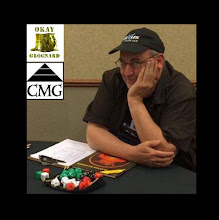The description from Board Game Geek is as follows:
In Agricola, you're a farmer in a wooden shack with your spouse and little else. On a turn, you get to take only two actions, one for you and one for the spouse, from all the possibilities you'll find on a farm: collecting clay, wood, or stone; building fences; and so on. You might think about having kids in order to get more work accomplished, but first you need to expand your house. And what are you going to feed all the little rugrats?
The game supports many levels of complexity, mainly through the use (or non-use) of two of its main types of cards, Minor Improvements and Occupations. In the beginner's version (called the Family Variant in the U.S. release), these cards are not used at all. For advanced play, the U.S. release includes three levels of both types of cards; Basic (E-deck), Interactive (I-deck), and Complex (K-deck), and the rulebook encourages players to experiment with the various decks and mixtures thereof. Aftermarket decks such as the Z-Deck and the L-Deck also exist.
Agricola is a turn-based game. There are 14 game rounds occurring in 6 stages, with a Harvest at the end of each stage (after Rounds 4, 7, 9, 11, 13, and 14).
Each player starts with two playing tokens (farmer and spouse) and thus can take two turns, or actions, per round. There are multiple options, and while the game progresses, you'll have more and more: first thing in a round, a new action card is flipped over.
Problem: Each action can be taken by only one player each round, so it's important to do some things with high preference.
Each player also starts with a hand of 7 Occupation cards (of more than 160 total) and 7 Minor Improvement cards (of more than 140 total) that he/she may use during the game if they fit in his/her strategy. Speaking of which, there are countless strategies, some depending on your card hand. Sometimes it's a good choice to stay on course, and sometimes it is better to react to your opponents' actions.
I found it difficult to get rolling in this one as the cards I had were good midgame cards but little was available to me for early use. I had to get a few out in play just to use others that would be of some benefit to me. I also found it tough to present obstacles to other players without wasting turns of my own, given what I needed in resources based on where my cards had led me. Maybe it was just first-timer flailing but it felt more like driving in a school zone after have participated at Indy. I'll give it another go but I hate to waste too much precious game time on a lesser game in a series when I know I love several others.
Focusing on the roots of current tabletop gaming
with an eye toward the last century and before.
with an eye toward the last century and before.
Please Like, Share, Plus, Tweet, Follow, and Comment!






No comments:
Post a Comment